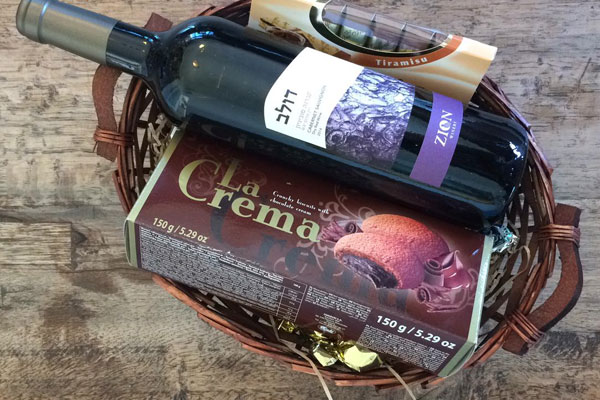The diplomatic faux pas is indicative of just how impossible it is to distinguish between Israel and its illegal settlements these days.

Human rights organizations in Israel were in for a surprise on Monday when they opened Rosh Hashanah gift baskets sent by the U.S. Embassy in Tel Aviv. Among the various goodies delivered in honor of the upcoming Jewish New Year — such as chocolates and honey — was a bottle of wine produced in the occupied West Bank.
A broad range of organizations including Peace Now, B’Tselem, and Yesh Din which focus on Palestinian rights and settlement expansion in the occupied territories, were among those to receive the gift basket.
The wine, a Cabernet Sauvignon named “Dolev,” is produced by the Zion Winery located in the West Bank settlement Mishor Adumim. The winery’s website provides a terse historical description, omitting any mention of the fact that it operates out of occupied territory:
The Israeli wine industry is made up of six large wineries — Carmel, Barkan, Golan Heights, Teperberg 1870, Binyamina and Tishbi — and dozens of medium and small wineries, totaling over 150 wineries, and about 12,000 acres of vineyards, according to settlement watchdog Who Profits.
While the wine industry is known for providing information about the origin of grapes that are used in the production of wine, there are several methods to conceal information concerning grapes from settlement vineyards in occupied territory. Investigating the connections of the Israeli wine industry to settler vineyards, Who Profits found that while grapes from the Golan Heights are used quite openly, the wineries that use grapes from West Bank vineyards most often use a myriad of methods to conceal their origins.
Settlement goods, including wines, have been the target of boycotts both inside and outside Israel over the past several years. Vinters in the West Bank have reported an increasingly difficult time selling their products as a result of the growing movement to boycott Israeli products, which was bolstered late last year after the European Union passed a set of guidelines to accurately label the origins of Israeli goods produced beyond the Green Line. EU member states are now able to determine which punishments to enforce on anyone who does not abide by the regulations (the regulations require states to levy sanctions against those who violate them).
The embassy’s decision to include settlement wine in holiday gift baskets is even more curious when considering the U.S.’s position vis-a-vis settlement goods. Every single U.S administration since 1967 has openly opposed Israel’s settlement enterprise, which Washington deems an obstacle to any peace accord. Furthermore Congress has often coupled its support for Israel with outward rejection of the government’s settlement policies – including forbidding the use of U.S.-backed loan guarantees for settlement activity.
In July of last year the U.S. State Department made clear that while the administration “strongly opposes” any boycott, divestment or sanctions against the State of Israel, that same protection is not extended to what it termed “Israel-controlled territories.” According to the statement, the U.S. has “never defended or supported Israeli settlements or activity associated with them, and, by extension, does not pursue policies or activities that would legitimize them… Administrations of both parties have long recognized that settlement activity and efforts to change facts on the ground undermine the goal of a two-state solution.”
Last Christmas, presumedly in response to settlement labeling efforts in Europe and pushback in the White House against the conflation of Israel and its settlements, Israeli ambassador to the United States Ron Dermer sent a holiday gift basket to American officials in Washington, including the White House, comprised exclusively of goods produced in the occupied West Bank and Golan Heights.
A number of U.S. states in recent months have passed legislation barring state capitols from doing business with companies that engage with boycotts of Israel, including boycotts of its illegal settlements. While many supporters of the Palestinian-led Boycott Divestment and Sanctions (BDS) movement call for the boycotts of all Israeli products, many progressive Israeli and Jewish groups and individuals advocate a boycott limited to Israel’s settlement enterprise and the products and services it directly produces.
The inclusion of the settlement wine in the U.S. Embassy’s gift basket was likely merely a faux pas by somebody in the protocol office, and not a hint at changing policy. It is, however, indicative of how increasingly difficult it is to distinguish between the economy of Israel proper and that of its settlements in the West Bank; it is almost impossible to avoid settlement products as a consumer. As far as the Israeli economy goes, there is no Green Line, and thus there is almost no way to boycott settlements.

